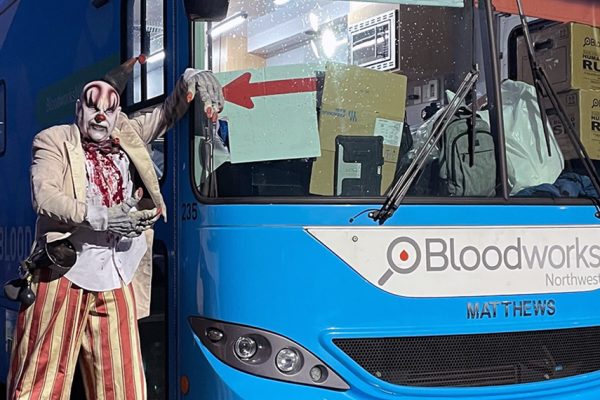We are thrilled to announce that four Bloodworks teams have received over $3.7 million in grants from the Andy Hill Cancer Research Endowment (CARE) Fund to bolster the growth of our research, apheresis, and cell therapy programs in support of patients battling cancer.
In 2022, the Washington State legislature made a commitment to improving the lives of Washingtonians through an historic investment in cancer research through the CARE Fund. With the announcement of their Shared Resources and Infrastructure grant, they intend to bolster Washington State’s cancer research ecosystem by supporting efforts to plan, develop, or support shared resources that will advance cancer research in Washington State. After an extensive grant review process, the CARE Fund approved eight awards, four of which were given to Bloodworks Northwest.
Three of these grants support infrastructure growth of Bloodworks Apheresis Therapy and Bloodworks Bio, the robust immunotherapy support division of Bloodworks that provides specialized blood products to biotechs, hospitals, and universities for the development of emerging medical treatments. These infrastructure improvements include an expanded Apheresis Center for donors and patients, a new specialized clean room for immunotherapy manufacturing, and a new quality monitoring system for large-scale production. This infrastructure will mean more new cancer treatments for Washington State residents, faster.
The fourth grant supports the growth of our internationally renowned Research Institute, exploring the opportunity to offer our expertise and equipment to researchers outside of Bloodworks. This feasibility study will ultimately provide WA State cancer researchers with more resources to achieve better outcomes for patients.
Bloodworks CEO and President Curt Bailey says, “taken as a whole, these awards from the Andy Hill CARE fund are a resounding affirmation of our growth potential in helping our community fight cancer and a public recognition of our track record of scientific, clinical, and operational excellence.”
Summaries of the four projects can be found below. If you have any questions, or would like to financially support any of these initiatives, please contact Emily Herrera at [email protected].
The pipeline for cancer immunotherapies in the US, from research discovery to clinical trial to commercial manufacturing, faces severe bottlenecks due to a lack of skilled cell processing and manufacturing partners. Without addressing these bottlenecks, we risk delaying access to lifesaving treatments for current cancer patients locally and around the country. To overcome the challenges, we will add a new certified clean room to Bloodworks Bio’s established manufacturing facility, led by Tim Waters and Dr. Zack Li. This resource will provide researchers in Washington State with a trusted partner that can collaboratively assist them at every step along the way to an FDA-approved, commercially available immunotherapy. Together, we can greatly reduce the timeline from discovery to treatment, getting lifesaving cancer treatments in patients’ hands sooner.
Of the many challenges facing new cancer immunotherapies, those most critical to patient outcomes occur during the “vein-to-vein” period – the time between when blood is donated and when it is infused into the patient. If this period isn’t highly regulated, monitored, and documented, there is significant risk of developing cancer treatments of compromised quality. As Bloodworks Bio continues to rapidly scale up our support of cancer immunotherapy research, development, and manufacturing, we must create efficiencies for storing and sharing this critical product information. To accomplish this, we will onboard a new state-of-the-art electronic record system capable of managing large-scale production. With improved transparency and reporting capabilities, Bloodworks Bio can support more research, clinical trials, and commercial manufacturing of cancer therapeutics in WA state. Better visibility means better reproducibility, more rapid advancements, and ultimately, better patient care.
Specialized apheresis centers, where blood products are both collected from donors and infused into patients, are required for the development and manufacturing of cancer immunotherapies. Currently, the limited number of apheresis centers in Washington State, and around the country, is restricting the rate at which new cancer immunotherapies are developed. To address this urgent need, we are doubling the capacity of the Bloodworks Center for Apheresis Therapy (BAT).
With this expansion, BAT will become the premier apheresis center on the West Coast. The floor plan and donor journey we’ve designed will elevate the apheresis donor’s safety, privacy, comfort, and experience, as well as the quality of the product. By ensuring the best possible starting material for the latest cell-based immunotherapies, we are ensuring a healthier future for cancer patients. Construction on the new center began in August 2023 at our Central Seattle headquarters. We expect to welcome our first donors into the new space in early 2024. Together, we will create lifesaving cancer therapies, faster.
Thrombosis, or abnormal blood clotting, is a very common complication of both cancer and cancer treatments, estimated to occur in up to 30% of patients. Cancer-associated thrombosis (CAT) imposes a tremendous burden in terms of morbidity, mortality, and cost. Bettering our understanding of how cancers or cancer therapies impact blood will lead to improvements in treatment, and ultimately improve survival.
While Bloodworks Research Institute has both the equipment and expertise to study CAT, we do not currently have a model for offering these resources more broadly to the Washington cancer research community. Therefore, we will undertake an investigation of the feasibility and sustainability of offering our comprehensive knowledge of thrombosis, our state-of-the-art equipment, and our collaborative approach to science as a shared resource to the WA cancer research community. This will ultimately provide researchers with the capacity to explore CAT risk in their research, which we expect will lead to better cancer therapies with improved patient outcomes.




Tell Us What You Think!